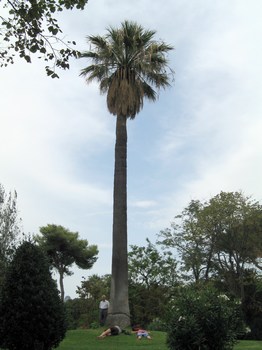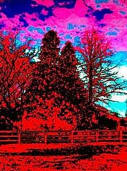
Cedar Gallery
Home
|
Cedar info |
News |
Contact |
![]() Dutch
Dutch
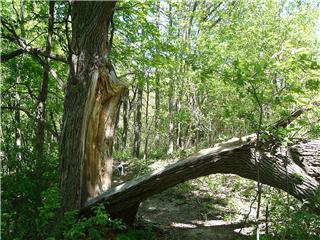

Foto ©:
anatta
A Poison Tree
I was angry with my friend:
I told my wrath, my wrath did end.
I was angry with my foe;
I told it not, my wrath did grow.
And I water'd it in fears,
Night & morning with my tears;
And I sunned it with my smiles
And with soft deceitful wiles.
And it grew both day and night,
Till it bore an apple bright;
And my foe beheld it shine,
And he knew that it was mine,
And
into my garden stole
When the night had veil'd the pole:
In the morning glad I see
My foe outstretch'd beneath the tree
William Blake
Elegy For A Tree
Eighteen years he stood beside my window
And with the curiosity of a dog's nose
He probed with his shadowing leaves at the walls
"What's going on in there?"
He listened for the scratch of my pen, the creak of my chair.
"Something new on your desk?"
Often I felt that he rejoiced with me
Over a freshly-coined rhyme or a well-built stanza.
And sometimes late at night, he tapped at my window:
"Go to sleep, fool,
Nothing will come of it anyway"
How amazing was the place where he began
From under iron gratings near a cellar stair
He had emerged, a delicate sapling with one bud as a cap
Humbly trembling in the wind
As if he were asking of the world
"May I?"--
He never grew at all in height.
Only in breadth, contrarily, a cripple right from birth.
Each year a new bough, a new deformity,
More branches--more monster;
Octopus-like, he bent and broke around him
Steel, stone and concrete,
Till he saw me through the window
And entrusted his life to me.
And after the iron he had overcome
There were so many monkey-quick climbing children.
So many hooks holding long lines of laundry,
So many carved names, dates and little hearts--
Albums of innocent young loves…
And now, when I look at the shattered whiteness of the broken trunk
With the saffron-yellow ring in the center
I can hardly remember that he ever bloomed at all.
I saw him in despair
When the blue silk of evening enfolded us both
In melancholy.
In white deep nights I would hear him sighing through the frost
"It goes badly for me, near one."
I saw him in a joyous mood
When April besprinkled him with life
Breathing upon him diamond bright warmth;
As I would open the window
He would blow in a breath
Of lilac sweetness from his heart's core,
"All for you, I have no one else."
I never even knew his taxonomic name
Or from what genus he came,
From which Gehenna, which oasis.
Eighteen years--just think--
Not only his
But a great portion of my life too,
With one thunderclap--null.
Today, I haven't wound my watch,
I skipped two meals
And never took the pipe from my mouth.
Alter Esselin,
transl. Joseph Esselin

Foto ©:
anatta, canada
Trees
Trees die not alone.
They take along with them:
The violins of the winds,
The hymns of the nests
The mirrors of the sun,
The laughter of leaves,
And a delicate perfume.
They leave behind only the mystery
Of their unity and patience.
Trees die not alone.
Trees don't die like men.
Alter Esselin,
transl.
Joseph Esselin
Dismantling the Birches
for James Lasdun
“Topped, dropped & chipped 2 dead white
birch trees”
reads the bill arriving one week later.
The damage? “Labor & Equipment – $250,”
though it’s no sure bargain: blithe empty air
now all that’s left of what once stood, who knows,
a lifetime? a century?, their tall, swaying might
reduced to firewood we’ll burn this winter.
Still, it was time. The birches too near
the house,
one windy night a heavy limb broke loose,
waking us with a thunk so loud we thought
the end of sleep had come, our roof done in
and leaking through November’s bony cold
until next morning workers broke the news:
nothing for it, those trees were coming down.
Summer. Morning. A locust’s rising whine,
the day a promise caught in each chuckling leaf,
as a boy I loved their white thrusting shoots
rising like a massive V outside my window,
each trunk’s diameter twice my skinny arm across,
the scarred papery bark a sheet inscribed
with twists and leanings, weather written in.
How many summers had they seen? What
kites
had disemboweled flight among their branches?
And who could know what kind of spell or luck
had let them grow so tall, lightning blasts
and blight, drought and winter gales, the gamut
of experience as like to strike them down
as nurture lasting reach into a pale blue sky.
I blink my eyes, but yes, they’re really
gone,
leaving behind a golden sawdust sweet
with desolation, its smell the pungent tang
of a chainsaw gnawing wood, the acrid oily buzz
lopping off a branch as if dismembering a doll
naked with abuse, as the saw’s last throaty chug
digs and burrows, mad for the meaty girth.
Absence now becomes them, or at least
it must: sawdust, wood chips, and firewood
soon vanishing as well. Meanwhile, the view
has opened, and with it a landscape appears,
unseen before, yet obviously always there,
iron grey in autumn, a stillness loud with geese
on their necessary flight above the trees.
Peter Filkins
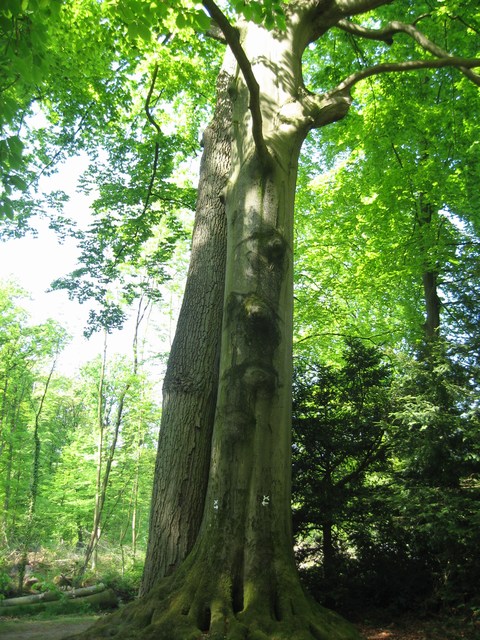
Photo: alywagenvoorde
Tree
Yes, often an olive wants to be a fish,
An almond often wishes to be a bird
I am pretty well accustomed to being like this now
Just a while ago I changed into human form
For a few minutes
My supple soft skin, my bones and the flesh wrapping around them
They all felt eerie to me
But in a while when I revert to being a tree
How fondly I will reminisce
About the human body I have now
My fingers, nails, and joints
How marvellous!
I have bones; I have muscles to pull my bones,
And skin covers all
My blood is coursing on and on
I can move myself, like this, any way I want to
I can point at the sky
I can stroke my hair!
Grasses, leaves, fruit or branches cannot do what I can –
They stretch their branches, turn their leaves
Lazily toward the light,
Yes, really, “lazily” as you’d say in human tongue
But when I was a tree, it did not feel so lazy
Rather, it was more like securely
Rather, it was more like steadily
What is this fury inside the human body?
It makes me dizzy
Look
Bones and muscles shed their old selves
To make new bones and muscles
Much has changed between now and just a while ago
When I first met you
So this is what aging means, isn’t it?
|
Uh, |
|
Please, tell me.
As I place my hand here like so
The sound of your blood rushing in your chest
Grows so fast
Time is running out. Please, please tell me
What is the biggest thing I missed doing.
I feel as if there is something I should do, something fervent
Something I’d move my muscles for
Something I’d violently rub my joints for
To chat
Isn’t there something else that is more important?
What is it?
What is this something humans do to be wholly human?
Just a while back
When you placed your manly hands on my womanly shoulders
My female muscles and bones felt a certain
Fulfilment and warmth
Doesn’t that have much to do with
What I have yet to do?
Am I not missing something
Something violent
That goes well with the fury of metabolism
In this human body that holds bones and muscles?
But maybe I am wrong
Am I just babbling human words
While thinking like a tree?
What?
Are you saying I’ve missed doing something?
Tell me
Please
Why do you hesitate?
So you are saying, aren’t you, it is different from
Talking,
Pointing,
Jumping,
Counting numbers and the like?
Goodness, how pained you look!
I thought humans had a wonderful thing called words
Which allow you
To convey, to inform or to express anything you want to,
But there are things that words can’t help –
Ah, there’s no time left
I want to know
What it is that I missed doing
With no words,
This
Is what you can tell me, isn’t it?
As you clasp my shoulder as you are doing now
With your five fingers wrapped around my shoulder
Your thumb
Your forefinger
Your middle finger
Your ring finger
And your little finger
Five shocks run through me
Hurry! Time is running out!
Hiroshi Kawasaki
From: Poems, publisher:
Kokubunsha, 1968
Translation: Takako Lento
Trees and other poems (1914)
I think that I
shall never see
A poem lovely as a tree.
A tree whose hungry mouth is prest
Against the earth's sweet flowing breast;
A tree that looks at God all day,
And lifts her leafy arms to pray;
A tree that may in Summer wear
A nest of robins in her hair;
Upon whose bosom snows has lain;
Who intimately lives with rain.
Poems are made by fools like me,
But only God can make a tree.
Joyce Kilmer
'Trees'
- this poem was first published in Poetry: A Magazine of Verse Vol.2
(August 1913)
|
The Killing of a Tree
This time he was not there-
His worn leathery trunk
In sun in rain
He’d accost from afar, “Who goes there?”
In
fact, there always lurked in our ways had to be saved-
river from
becoming drain
jungles from becoming deserts
Kunwar Narain, 2002 |
|
The Stolen Branch
In the night we shall go in
to steal
a flowering branch.
We shall climb over the wall
in the darkness of the alien garden,
two shadows in the shadow.
Winter is not yet gone,
and the apple tree appears
suddenly changed
into a cascade of fragrant stars.
In the night we shall go in
up to its trembling firmament,
and your little hands and mine
will steal the stars.
And silently,
to our house,
in the night and the shadow,
with your steps will enter
perfume's silent step
and with starry feet
the clear body of spring.
Pablo Neruda
Utopia
Island where all becomes clear.
Solid ground beneath your feet.
The only roads are those that offer access.
Bushes bend beneath the weight of proofs.
The Tree of Valid Supposition grows here
with branches disentangled since time immemorial.
The Tree of Understanding, dazzlingly straight and simple,
sprouts by the spring called Now I Get It.
The thicker the woods, the vaster the vista:
the Valley of Obviously.
If any doubts arise, the wind dispels them instantly.
Echoes stir unsummoned
and eagerly explain all the secrets of the worlds.
On the right a cave where Meaning lies.
On the left the Lake of Deep Conviction.
Truth breaks from the bottom and bobs to the surface.
Unshakable Confidence towers over the valley.
Its peak offers an excellent view of the Essence of Things.
For all its charms, the island is uninhabited,
and the faint footprints scattered on its beaches
turn without exception to the sea.
As if all you can do here is leave
and plunge, never to return, into the depths.
Into unfathomable life.
Wislawa Szymborska
From "A large
number", 1976
Translated by S. Baranczak & C. Cavanagh
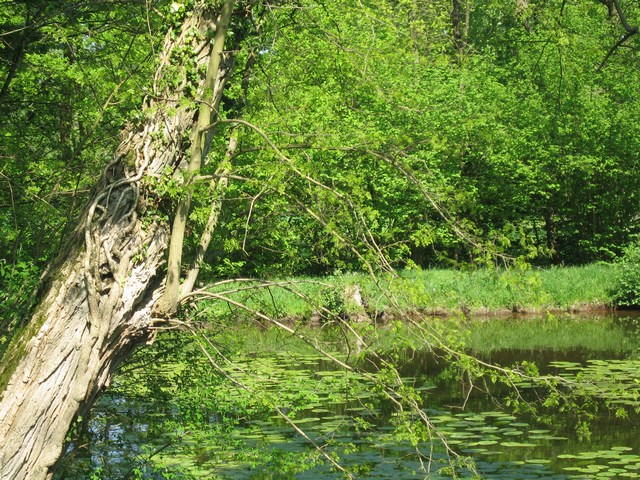
© alywagenvoorde
In the Sanatorium for
Trees
There is no place like the
sanatorium for trees
To serve your probation.
The moon rubs its balm
on barren heads.
The rain rehydrates parched
desires.
The sun decongests swollen
memories.
The wind rushes in with tincture
and cotton wool
to dress the wounds of spring.
Walk gently through the
wards.
Do not disturb:
Over-ripe ambitions,
castrated longings,
papayas with unusually large
breasts,
punnagams on chemotherapy.
Walk on without fear -
they are too disorganized
to remember you
or the concoctions of death
you poured into them.
They stare stonily into the
distance
as soothing hands unravel their
matted hair
and pour lukewarm water on
their heads.
Walk up the path
to the kindergarten for saplings,
sing with them the glory of
green,
take them into the woods
along the giggling stream,
leave them with their doting
nannies.
Turn back
only to wave them goodbye.
Back in the wards
the odeur of death
hangs in the air.
There is no return:
You are sentenced to life
with the sun,
the rain
and the wind
in the sanatorium for trees.
Veerankutty
from: Manthrikan, DC
Books, 2004
translation: K.M. Sherrif
One of our primary goals at Cedar Gallery is to provide a public forum for both unknown and established poets to showcase their works. We particularly encourage contributions from unpublished aspiring artists, but are happy to consider all submissions.
Please, send your contributions to: cedars@live.nl
![]()
![]()
